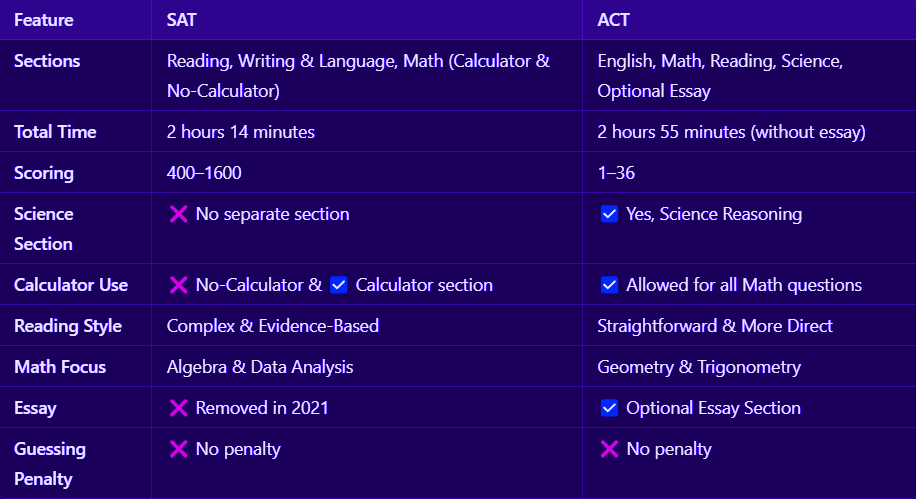Introduction
If you’re a high school student preparing for college, you’ve likely come across two major standardized tests: SAT and ACT. But which one should you take? While both exams are widely accepted by colleges, they differ in structure, content, and scoring. Understanding these differences can help you choose the test that best suits your strengths.

Key Differences Between SAT and ACT

Detailed Breakdown
1. Exam Structure & Content
The SAT focuses more on problem-solving, data analysis, and evidence-based reading.
The ACT includes a dedicated Science section and has more straightforward questions.
2. Math Section Differences
The SAT includes both a calculator and non-calculator section, emphasizing algebra.
The ACT allows a calculator for all math questions and includes more geometry and trigonometry.
3. Time Pressure
The ACT has more questions in a shorter time frame, making time management crucial.
The SAT has fewer but longer questions, giving test-takers more time per question.
4. Scoring System
The SAT is scored between 400–1600 (combining two section scores).
The ACT is scored on a 1–36 scale, with each section averaged for a final composite score.
5. Science Section
The ACT includes a Science section, testing reasoning and data interpretation.
The SAT does not have a separate Science section but includes science-based questions in reading and math.

Which Test Should You Take?
Choosing between the SAT and ACT depends on your strengths and test-taking preferences.
Here’s how you can decide:
If you prefer more time per question, the SAT is the better choice, as it allows for a slower pace.
The ACT, on the other hand, requires faster responses with tighter time constraints.
If you have strong algebra skills, you might perform better on the SAT, which focuses heavily on algebra and data analysis.
The ACT includes more geometry and trigonometry, making it a better fit for students comfortable with those topics.
If you want a dedicated science section, the ACT is the right choice, as it has a separate Science Reasoning section.
The SAT does not have a dedicated science section but incorporates science-related questions into other sections.
If you are more comfortable with geometry and trigonometry, the ACT is the better option, as it includes more questions from these areas.
The SAT places less emphasis on geometry and trigonometry.
If you enjoy complex reading passages that require deep analysis and evidence-based reasoning, the SAT might suit you better.
The ACT reading section is more direct and typically easier to comprehend quickly.
If you can handle faster-paced questions, the ACT is the better choice.
The SAT allows for slightly more time per question, making it better for students who prefer a slower pace.
By considering these factors, you can choose the test that aligns best with your strengths and maximizes your score potential!
Tips to Decide
✔️ Take a Practice Test for Both – Many students score better on one test than the other.
✔️ Consider Your Strengths – If you enjoy problem-solving, SAT might be better; if you prefer straightforward questions, ACT might suit you.
✔️ Check College Preferences – Most colleges accept both, but some might favor one over the other.

Final Thoughts
Both SAT and ACT are excellent options for college admissions. The best choice depends on your test-taking style, academic strengths, and college goals. Take practice tests, analyze your performance, and choose the one where you can score the highest!
Need expert guidance? At Tutorang, we offer one-on-one tutoring to help you ace your exams! 🚀
Reach out to Tutorang.com